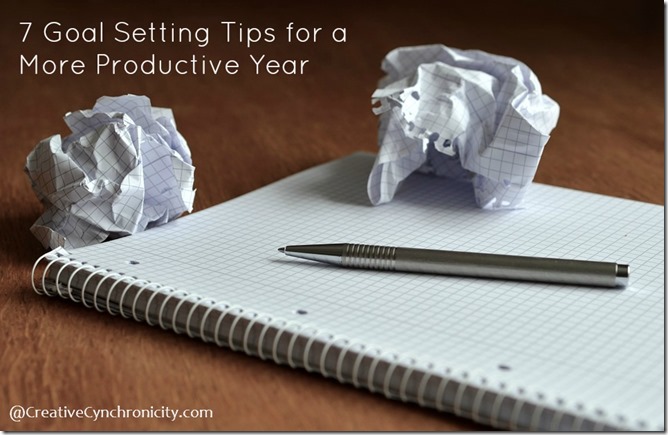I always used to think of myself as a goal-oriented person. I was always writing lists of things I wanted to accomplish, and places I wanted to go. Sometimes they took the form of New Year’s resolutions. Sometimes they were more like bucket lists, but over the years, one thing has become quite clear.
They weren’t really goals. They were wishes. What I’ve learned since then is that wishes need planning behind them if you want them to become goals. And goals are ultimately what becomes reality.

7 Goal Setting Tips for a More Productive Year
Here are some of the goal setting tips I’ve found to be most valuable. They have increased my productivity and helped turn my dreams into reality:

You probably think I now have 5 and 10 year plans but you would be wrong.
I don’t believe in them. I really don’t think it’s possible to plan that far out – just too many variables that are impossible to account for. These 5 and 10 year plans are more like 5 and 10 year dreams.
Instead, I keep my goal setting timelines to a maximum of a year and in general, I prefer to work monthly or quarterly. This keeps my goals much more focused and easier to attain.
I start goal setting by doing a brain dump.
I sit down and simply start writing down everything I can think of that is on my mind that I need or would like to get done. It can be anything from household tasks like getting quotes on having a new garage roof put on to loftier dreams like living in Paris for a month.
I post this list on my fridge where I can continue to add to it as I think of more things. From there, I can pick out some of the items and start making concrete plans for them. Once broken down into smaller steps, I can begin to add some of these to my monthly/weekly calendars and then to daily to do lists.
Make SMART goals.
Too often I hear about people setting goals like “I want to eat better” or “I want to make more money”. These are far too generalized and difficult to implement. You can learn more about SMART goal planning in a previous blog post I wrote.
Check in on your goals regularly.
This is another reason I don’t set really long-term goals. I like to break my goals down into bite-size pieces and then re-evaluate them on a regular basis. One time I check in is every evening before I go to bed. I take a look at my to do list for that day and assess how well I’ve done. This is not a chance to berate myself for the things I didn’t accomplish but rather a way to give myself a pat on the back for what I did get done and to look at what’s left.
Sometimes, when I look at the incomplete items, I realize that upon second thought, they aren’t something I really want to work on. Or perhaps, I’m stalled on that particular goal and it might need a different approach if I want to achieve success. If it is still a relevant goal, I move it to another day’s to do list.
I also like to do a quick check in weekly with slightly more comprehensive ones monthly and quarterly. I think it’s important to keep your goals uppermost in your mind if you want to achieve them!
Use a timer.
When you break your goals down into smaller tasks, set time limits on those tasks where possible. No matter how mundane and tedious a task may be, if I know I only have to do it for 15 minutes, it doesn’t seem so awful. I set a timer and get down to work!
Celebrate what you accomplish.
I don’t just keep to do lists – I also keep a ta da list. That’s where I write down my accomplishments, big and small. Some days, when my health is not the best, “had a shower” and “made dinner” might be the only accomplishments on my list but still, it’s something.
These can also be helpful when you do your goal reassessments. You might see some patterns that will help identify what’s most important to you or what you find easiest to get done. Why does that matter? Because it can help you figure out what goals you find the most difficult and perhaps, how to restructure them in a way that works better for you.
Find yourself an accountability partner.
Often I message my friend and let her know about the 3 most important things I’m working on that day. Just telling someone else that these are priorities helps me better focus on them. Knowing that later in the day she will ask me how I did on them is often just the motivation I need.
Not only that, but sometimes a partner can help you see the roadblocks that might be getting in the way of you achieving your goals. They can offer suggestions on a new approach and give you much needed perspective.

What are your favourite goal setting tips? Share them in the comments below.
Leave a Reply